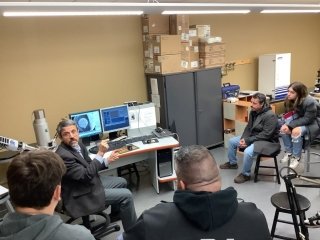CU-Lock Haven welcomed prospective students during Engineering and Physics Major Showcase
Lock Haven
Posted

Commonwealth University-Lock Haven held an Engineering and Physics Major Showcase on Dec. 8, that has attracted prospective students interested in the new engineering and physics programs. The faculty were excited to prepare for this recruitment event and to showcase the educational opportunities in engineering and physics.
Dr. Anura Goonewardene presented the new engineering and physics curricular options and described the scholarships available to qualifying students including the National Science Foundation funded “CU-THRIVE in STEM scholarship program.
“We strive to meet the student demand with a flexible array of engineering (3-2), engineering technology (2+2) and engineering physics programs, and to attract external funding to support them financially as much as we can,” Goonewardene said.
The university faculty immersed the visitors in the classroom atmosphere of the campus. During the interactive lab on waves and sound, the visitors completed a task that is typically part of a regular physics laboratory class. They experienced the multiple approaches that are used in classrooms including a physical experimentation, a multimedia demonstration and the connection with an everyday device; in this case an acoustic guitar.
“We wanted to engage the students and their families and let them experience the range of instructional activities we use in the classroom/laboratory,” said professor Michael Cullin.
The visitors toured the Nanotechnology Cleanroom and finished with a demonstration of electron microscopy imaging and elemental analysis. Under the guidance of Dr. Marian Tzolov, a prospective student learned how to change the magnification and focus the Scanning Electron Microscope (SEM). During the live imaging, the visitors observed the layered structure of a human hair and ZnO nanowires that are one thousand times thinner.
“The advanced equipment that you see in our labs is for hands-on use by the students in their classes and research projects,” Tzolov said. “It is a safe and welcoming environment to explore nature, and gain experience for their future careers. We are excited to revive our tradition of involving students in undergraduate research.”
